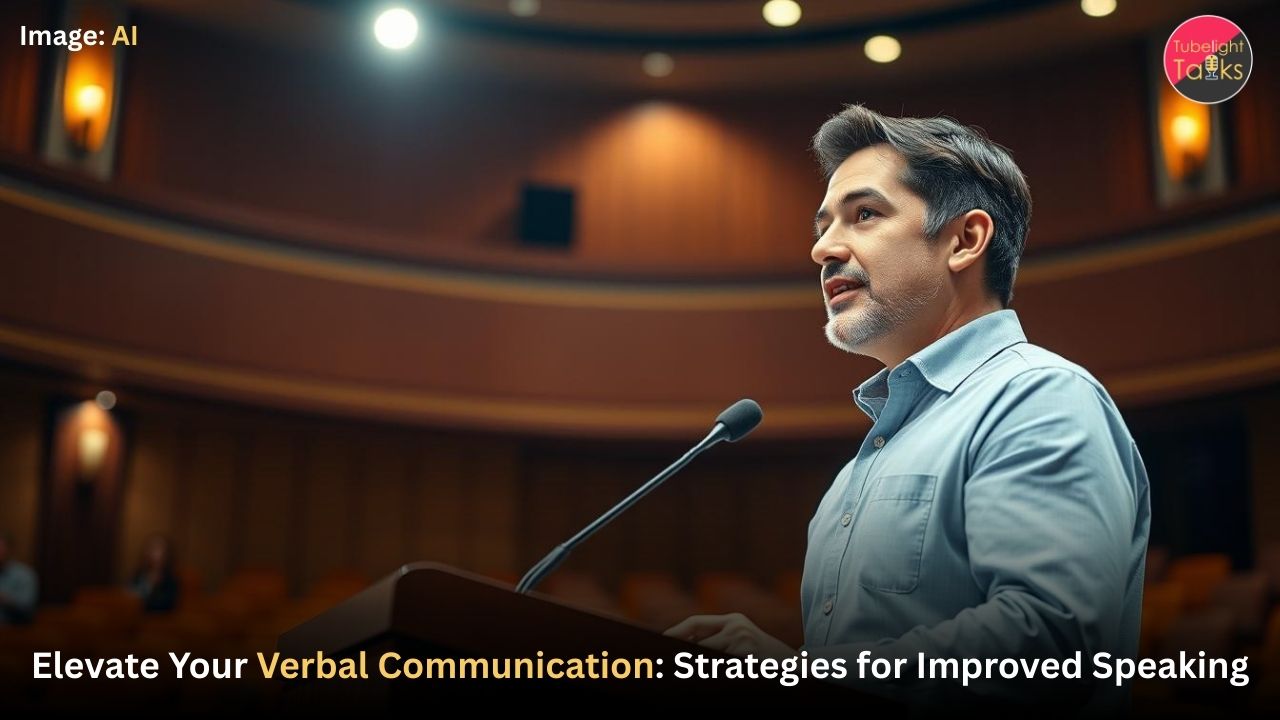Elevate Your Verbal Communication: Strategies for Improved Speaking
With these tips, you’ll talk better and feel more confident. You’ll learn how to share your ideas clearly and make stronger connections with others.
Key Takeaways
- Understand the importance of verbal communication in personal and professional settings.
- Learn strategies to enhance your public speaking skills.
- Discover techniques to improve your everyday conversations.
- Build confidence in articulating your thoughts.
- Develop stronger relationships through effective communication.
The Power of Effective Verbal Communication
Good communication is key to success at work. It helps you share ideas, negotiate, and build strong bonds with others. This is true for both colleagues and clients.
Why Speaking Skills Matter in Professional Success
Speaking well is very important at work. It affects how people hear your message. It’s important for presenting ideas, negotiating, and talking about daily tasks.
The Indian Context: Unique Challenges and Opportunities
India’s diverse culture brings both challenges and chances for good communication. With many languages, talking clearly can be hard. But, this diversity also lets us learn about many cultures and languages.
How to Improve Speaking Skills: The Foundation
Good speaking skills start with mastering key areas. These areas help you speak clearly and confidently. To improve speaking skills, focus on pronunciation, vocabulary, and speech rhythm.
Mastering Pronunciation and Accent Neutralization
Correct pronunciation is key for clear talk. It’s hard, especially with a strong accent. Accent neutralization helps you be understood by more people. It means making your accent easier to understand.
Improving vowel sounds and diphthongs makes you clearer. Listen to native speakers and use online guides to practice.
Building a Robust Vocabulary for Eloquent Expression
Building a strong vocabulary is vital for clear talk. Knowing more words lets you share your thoughts better. Read a lot and keep a journal to learn new words.
Use new words in your talks and writing. This aids in remembering and utilizing them more effectively.
Perfecting Rhythm, Pace, and Intonation
The way you speak affects how people hear you. Focus on making your speech natural and interesting. Change your pace and use the right tone to add feeling.
Daily Pronunciation Exercises
Practice every day to get better at pronunciation. Try tongue twisters, read out loud, and record yourself. These assist you in recognizing and correcting your speech.
Recording and Self-Assessment Techniques
Recording yourself is a great way to improve. Listen to your recordings to find areas to work on. Regular checks help you see how far you’ve come.
To improve speaking skills, keep practicing and be open to learning. Focus on pronunciation, vocabulary, and speech rhythm. This will make you a better and more confident speaker.
Developing Confidence in Public Speaking
Getting better at public speaking is a big journey. It changes how you talk and share ideas. You’ll speak clearer and with more confidence.
Understanding and Overcoming Speech Anxiety
Many people get nervous when speaking in public. This fear comes from worrying about what others think. To beat it, first admit you’re scared. Then, find ways to handle it.
Using relaxation techniques like deep breathing can help. These methods calm you down before you speak. This way, you can focus on your message, not your nerves.
Structured Practice Methods for Indian Speakers
For those in India, practicing in a set way is helpful. It’s more than just speaking in front of a mirror. It’s about doing things that feel like real-life talks.
The Mirror Technique
The mirror technique involves talking to yourself in front of a mirror. You watch how you look and act. This helps you know how to improve your body language and expressions.
Progressive Exposure Exercises
These exercises mean slowly getting used to speaking in front of people. Start with small groups or online talks. Then, move to bigger crowds. This builds your confidence slowly.
Leveraging Cultural Storytelling Traditions
India loves telling stories, from the Ramayana to local tales. Using these stories in your talks makes them more interesting and real.
Telling stories in your speeches grabs people’s attention. It also makes complex ideas easier to understand. This way, your message sticks in people’s minds.
| Practice Method | Description | Benefit |
| Mirror Technique | Speaking in front of a mirror to observe body language and gestures | Improved awareness of non-verbal cues |
| Progressive Exposure | Gradually increasing exposure to public speaking situations | Building confidence in a controlled manner |
| Cultural Storytelling | Incorporating traditional stories into speeches | Making speeches more engaging and relatable |
Advanced Techniques for Impactful Communication
To talk in a way that really gets through, you need more than just basic skills. You should learn advanced ways to grab and win over your audience. These skills will make your words stick and have more power.
The Art of Persuasive Speaking
Persuasive speaking is a powerful way to influence thoughts. To get good at it, know your audience well, tell a strong story, and use special speaking tricks. Storytelling is key because it touches hearts. Stories make your message clearer and more convincing.
Mastering Non-Verbal Communication Cues
How you look and sound matters a lot. Your body language, face, and voice help people understand you. Maintaining eye contact, being open and sure, and changing your voice can help a lot. Paying attention to these signs shows you’re serious and true, making your words stronger.
Digital Tools and Resources for Speaking Enhancement
Today, there are many digital tools to boost your speaking. You can find apps to check your speech and online groups to practice and get feedback.
Speech Analysis Applications
Apps for speech analysis can show you how to get better. They look at how fast you talk, your tone, and how you say words. Using these apps can help you speak better and more clearly.
Online Communities for Practice
Online groups for speaking can be a great place to practice. You can do speaking exercises, get feedback, and learn from others. Being part of these groups can help you feel more confident and improve your speaking.
Conclusion: Your Path to Becoming an Exceptional Communicator
Think about the tips in this article. You’re starting to get better at talking. Learning to speak clearly and use the right words is key.
Being good at speaking in public and telling stories will help too. You’ll get better at sharing your thoughts and ideas. This makes you more clear and strong in what you say.
Using the tips from this article will make you a great talker. Start now and see how it changes your life. Your relationships, job, and personal growth will all get better.
Frequently Asked Questions
How can I improve my speaking skills?
To get better at speaking, practice every day. Work on how you say words, your vocabulary, and your rhythm. Also, ask others for their honest opinion.
What are some effective ways to overcome speech anxiety?
To beat speech anxiety, try deep breathing and positive thinking. Practice speaking in front of a mirror or with friends. This helps a lot.
How can I enhance my vocabulary for better communication?
Reading books and articles can grow your vocabulary. Keep a list of new words and use them in talks. This makes you sound smarter.
What are some digital tools that can help me improve my speaking skills?
Use apps and online sites for speech improvement. They offer tools and lessons to help you speak better.
How can I practice speaking with others?
Join a group like Toastmasters to speak with others. Or find a language partner online. This way, you can practice speaking.
What are some common mistakes to avoid when improving my speaking skills?
Don’t skip practice and don’t be too hard on yourself. Also, don’t forget to ask for feedback. This helps you grow.











Discussion (0)